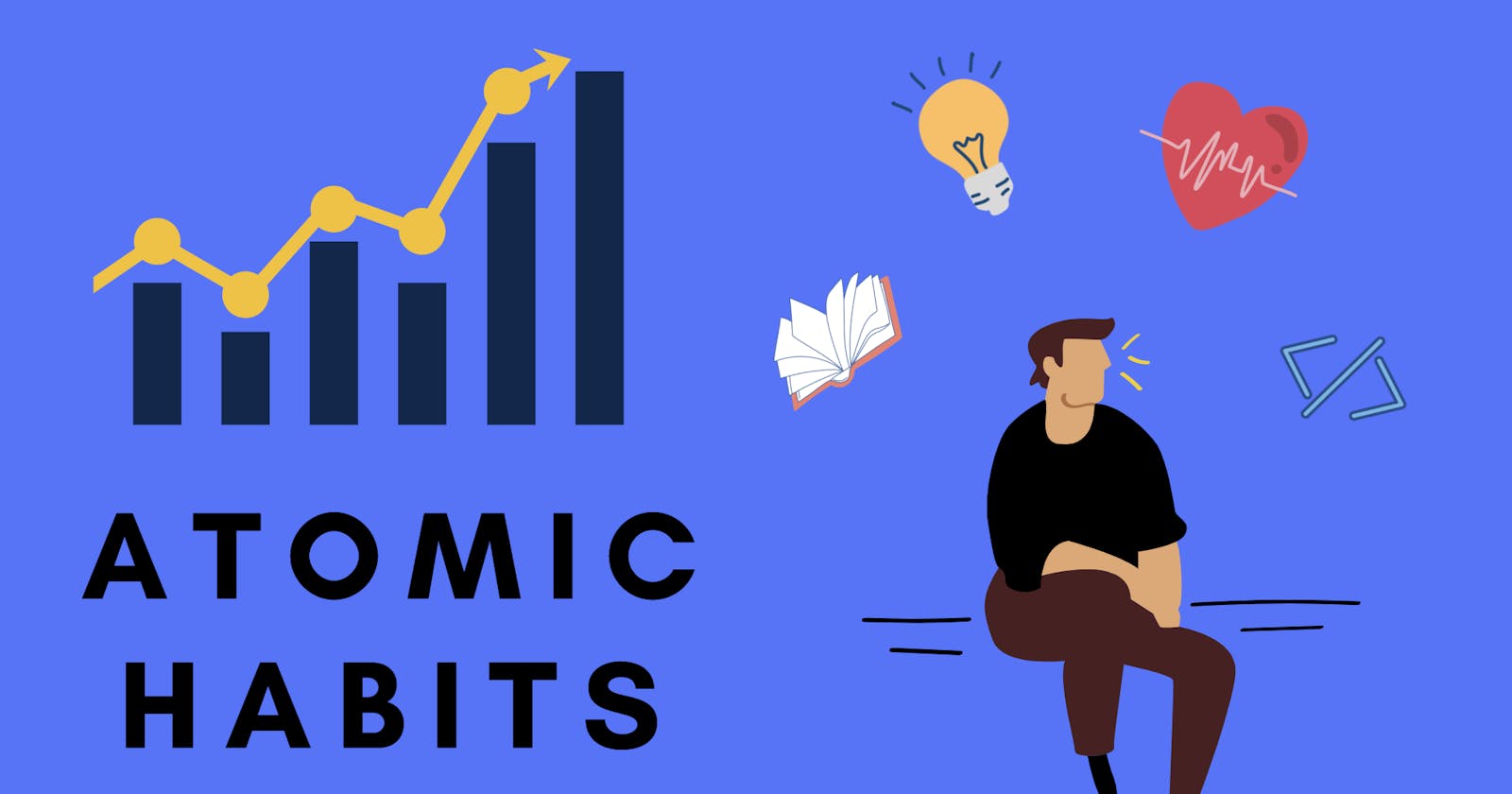Atomic Habits will drive you to that next level
A review with actionable steps
Table of contents
Let's begin with a story...
If you give a man $1, will that make him rich? What about another dollar? Would he be rich now? Adding another dollar? Will the 4th dollar make him rich?
At some point, you’re going to have to admit that after that last dollar, the man is now rich.

That’s what habits are about. Making small changes that lead to huge improvements. Atomic Habits by James Clear is one of those books that has so much useful information that you have to go back and reread it. It’s impossible to remember everything from the first read, and it’s such an easy and well-written book that you can go back to read it. I am planning on reading it every year, just to stay sharp. Pick up a few habits a year, and you’re gonna amazed at what happens in the long run.
By no means am I going to try to list all of his ideas, lists, methods, or ideologies in this blog post. Instead, I’m going to take his 4 Laws and provide examples and steps that I have taken, so you can start today. Hopefully this that will make you better at ANYTHING YOU CHOOSE! Of course, since this is Hashnode, my focus will be on programming, but please take these ideas and do with them what you will. Make them your own!
So, here goes. How can you ‘build good habits and break bad ones?’
The 1st Law - Make it Obvious
A great first step you should take if you want to change a bad habit is to make a list of ALL the current habits that you have. James makes it clear not to judge the habit as a good or bad (not yet!) but simply take a few days and write down the habits that you find yourself doing.
Here is a list that was included in the book…
- Wake up
- turn off alarm
- check my phone
- go to the bathroom
- weight myself
- take a shower
- brush my teeth
- floss my teeth
- put on deodorant
- hang up towel to dry
- get dressed
- make a cup of tea
… and so on.
After you have done this, mark the list with a positive (+), negative (-), or neutral (=) habit. This process is subjective and depends on what your goals are. If you're a muscle builder and want to gain weight then eating more eggs is positive, but if you want to lose weight then extra eggs are negative.

Don’t judge! Just mark it.
While you are doing this, make sure that you step back and see yourself from afar. Kinda like when I wrote this, I thought about how I drink a beer almost every day at 5:30pm on my workout days. That’s quite interesting that THAT person does that. Hmm…
Again, no judgement.
After you have an idea of what you like and don’t like, it’s time to make a relatively SMART goal. Choose some things you are negative and others you want to add. Use this as a template.
I will [BEHAVIOR] at [TIME] in [LOCATION].
What do you want to change? What do you want to improve? The template above will be a guiding light for your choices going forward. This is science. No, really, this template was taken from a study and had almost TRIPLE the impact as simply saying it aloud or doing nothing. So write it down. Make a plan.
After this, you can easily manipulate the schema to include another template for creating a habit.
After [CURRENT HABIT], I will [NEW HABIT].
I use these templates every day to get my coding practice in. It looks like this for me.
EXAMPLE:
I will [do one new React project] at [lunch time break] in [the office]. Furthermore, after [lunch], I will be [coding for 1-2 hours].
In real life, this is me. I have the luxury of a 2 hour lunch break to get my coding grove on, but it would be just as effective to do it for the 45 minutes you have for lunch or 1 hour after work. Whatever you want to do, set up a time to do it. Don't just say, I'll code a bit after I eat. That is not specific enough and will not drive your progress forward. Specificity is key. I know my cue now, it's entering my office after lunch. I'm just itching to open VS Code and start a project.
Pay attention to your CUE
You have a CUE… which leads to a CRAVING… and then a RESPONSE…. And then a REWARD.
This may be a bit difficult, but you should start to focus and identify the CUE that begins your automated habit-man. This is easier said than done. For me, a cue to listen to a book is getting into my car, alone, and driving to work (or home from work). At that point, I am always listening to an audiobook. Once I sit down, my phone comes out, I open the App, and I plug in the phone. The cue is the entire situation.
The car. Work. No one else. I don’t do this when my daughter or wife are in the car with me. They are not part of my cue for that habit.
Another cue for me is drinking a cup of coffee on the weekend. I wake up at 5am, go downstairs, get the coffee, come back up, and the first thing I do after setting down the coffee is open up my laptop. Now I wish that I’d always open up VS Code, but that’s not the case. (that's a habit/cue I have to work on) Other times, I flip through social media which is mostly coding related, but what’s really happening for me is that coffee. I have to wait to drink it, and once I set it down, the laptop opens. The programming process will begin.
To end every laws, he goes over the inverse of the law. They can also be beneficial but I won't go into too much detail here. But for the first law, I will. If you want to drop a habit, then you have to do the inverse.
Make it invisible.
- If you want to stop checking your phone so much during work time, set it in another room.
- If you want to stop looking at the social media accounts, delete them off your phone.
- If you’re playing too many video games, unplug it after every use and put it in a closet.
This invisibility feature works.

The 2nd Law - Make it Attractive
This is all about the dopamine spike. As you might know, dopamine is the pleasure drug naturally produced by your body during a pleasurable experience.
The strange thing about dopamine is that you only get a REWARD-DOPAMINE spike initially. This happens BEFORE the habit is formed. Eventually, after the habit is formed the dopamine spike will occur when the cue happens.
Dopamine spikes occur during the cue
As an example I used before, my dopamine spike for listening to audiobook happens when I open the car door, NOT when I am actually listening to the book. The dopamine spike for gambling addicts occurs when the enter the casino and hear the chimes and see the lights, NOT when they sit down to play.
Perform habits back to back to "sneak in" a new one
Changing OR creating a new habit is all about focusing on the cue. So, to combat this issue, a method called habit stacking is introduced.
This is a 2 parter, and it goes like this...
- After [CURRENT HABIT], I will [HABIT I NEED].
- After [HABIT I NEED], I will [HABIT I WANT].
It goes like this...
- After I start my coffee machine (current), I will do 10 pushups (need).
- After I do 10 pushups (need), I will drink my coffee (want).
Another one that I had a lot of success with was watching TV shows and working out. I really wanted to workout, but I also wanted to watch the latest Game of Thrones. And since they were about 60 minutes long, it was perfect. For this one, after I put on my workout gear in the gym, I'd put a TV show on my phone. This isn't anything groundbreaking, but it works! Simple! The key here (and next step) is not to overwhelm yourself

The 3rd Law - Make it Easy
Ah, the dreaded "make it easy phase." But this is a true key to success. If you have an extremely lofty goal, it's going to be quite difficult to get there. It's going to take time, effort, perseverance, frustration, failures, and a load of other setbacks to finally reach your dream.
I don't want to sound negative, but that's how it is. Programming and learning JavaScript is frustrating. I've spent hours "debugging" a misplaced curly bracket, and other times I've just moved on after days of no success. It's not always peaches and cream.
Reps
Because of this, you need to start small. There are plenty of stories in the book, but what it focuses on is the amount of repetitions you get while you are trying to change or build a habit. If you spend 7 hours on Saturday trying to learn a new front-end framework, it's not really going to pay off.
It is much better to focus for 30 minutes each and every day, even though the time spent may be less, the habit will be solidified quicker. After the habit is formed, then you can ramp up. Sure, if you want to spend 1 hour a day to make the time equal, that's great. But the real point is that you gotta get the repetitions in to improve.
When friction is low, habits are easy.
One story highlighted was about an overweight man that would not let himself workout for more than 5 minutes every. After 2 weeks of going to the gym, (now that his habit was formed) he extended his time since he was already changing, driving, and getting out on the gym floor. The habit was there, and now he could easily INCREASE EFFORT.
Start small. Write for 1 minute a day. Read for 5 minutes a day. Study Vue for 3 minutes a day. Once you start building up this habit with something easy and maintainable, you are more likely to continue with the habit and can extend your effort.

The 4th Law - Make it Satisfying
Do you know why there are bubbles when you brush your teeth or wash your hands? Because it's satisfying. They provide no use to cleanliness, they only provide a sense of satisfaction to the customer. In turn, it LEADS to cleanliness because who doesn't love bubbles!?!?
That's what you need to do. No, seriously. Make it satisfying. French fries are terrible for you, but that salty goodness is extremely satisfying. Our brains are programmed to enjoy fatty and high caloric foods because that's what we originally needed to survive.
So, how can you make your learning journey more satisfying?
Well, I haven't really figured that one out yet. But what I can say is that it is enjoyable to interact with people who are doing the same things, so become part of a group. Whether it is #100DaysOfCode or Twitch streamers or Youtube commenters or Redditors or here on Hashnode... whoever it is that you're surrounded by will help boost your efforts. I've experienced many times in my #100Devs cohort, and I hope you can do the same.
It's satisfying for me to get done with a project, show it to the world, and get feedback. Of course everyone loves positive feedback (and doesn't enjoy negative feedback), but the best part about the tech community is that 99% of what I hear is positive AND constructive. You'll need that negative feedback later, but that's after you've already build up enough of a foundation where you feel comfortable with your skills.
A common and satisfying thing I see in the Tech community is having people tell you "Wow! Great work, keep it up!"
I wish you the best of luck on building your habits!
That's it for now. If you liked what you read, please follow me on Twitter, connect with me on LinkedIn or follow me here on Hashnode.

